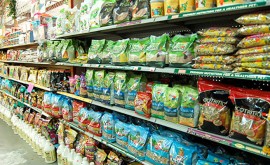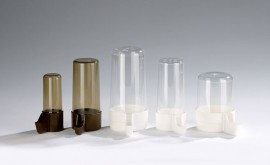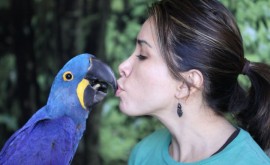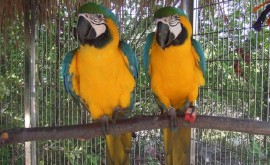For most parrots, Spring is the primary month for the reproductive cycle. Of course, based on the specific breed, as well as environment and other factors, breeding might take place during other times of the year. For instance, cockatiels and chickens breed more when there is plenty of daylight while other species prefer darker days or cooler weather.
For owners who want to deter reproductive behavior, the following should be considered.
Be Careful with Artificial Lighting
During the summer months there are roughly 12 hours of sunlight and darkness. However, in the fall and winter, bright days begin to shorten. As a result, people turn on more lights in the home, which for birds can signal the time to breed.
For this reason, it is important to make sure pet birds get adequate sleep, uninterrupted by artificial lighting. Even things like light coming from a computer or television can be enough to cause stimulation. After all, birds pineal gland is designed to “see” light, which is then interpreted as more daylight.
Offer the Right Type and Quantity of Food
Something that prompts the reproductive cycle in the wild for birds is a lot of high energy food, especially foods high in protein and fat. In the wintertime, wild birds are limited to the amount and type of food available, which means energy exertion is also reduced. For a domesticated bird, owners need to provide the right amount but more importantly, the right type of food.
As an example, fruits and vegetables are often available in abundance for birds in the wild so when birds in captivity are fed these same foods can promote sexual behavior. Therefore, to deter reproductive behavior, bird owners need to offer a high quality pelleted food as the main meal, coupled with small amounts of fresh fruits and vegetables, or other foods that birds enjoy.
Because the amount of fruits and vegetables is reduced during the fall and winter, birds need foods like flaxseeds and walnuts, which are a great source of omega 3 fatty acids. Owners also need to remember that birds, especially parrots, love to forage in the wild. Rather than clean up food from the bottom of the cage, allow clean food to stay for several days, recreating for the bird a more natural environment but also behavior. But remember “clean” is the key word here. Cockatiels are known for ground foraging. We use low ceramic dishes with clean rocks for the bottom of the cage to forage through.
Prevent Chewing
Parrots, as well as other bird species, love to chew on toys, plastic hangars, dog bones, paper, and other things. Not only is this the way birds play, it shows signs of nesting. In the wild, birds will chew up pieces of wood, sticks, leaves, and just about anything they can find to make a nest but to reduce reproductive behavior in pet birds, it is important to offer the right type of chew toys. Perhaps offering foraging for his food all day rather than chewing in his happy hut might be a better solution to just NOT offering him toys to chew.
Obviously, this can be tricky since birds love to chew for fun and as a way of keeping beaks filed down. However, chewing is also a part of the reproductive cycle. For this reason, a cage should never be covered, which makes a bird think of his home as a giant nest.
During the reproductive period, birds will chew inside a nesting box, putting wood chips or fibrous material on the bottom and working to raise the sides to keep baby chicks safely inside. While in the breeding season, simple play toys might be viewed as material for a nest.
In addition to not covering the cage in the fall and winter, a bird owner wants to offer lots of exercise by taking the bird out as much as possible. Even moving the cage’s location every few weeks will help. Also, bird fly and as such, they should be given the opportunity to fly freely about the house several times each day. Remember, even when a bird’s wings are clipped, he can still flutter down from the cage to get exercise.
Birds love to be bathed as well. This can be done by placing a bird in a few inches of water in a sink or bathtub or simply using a spray bottle to mist the feathers. However, rain is another aspect of a rainforest that commonly occurs most during the breeding season. To deter breeding, a bird owner should hold off on the bathing until spring or summer.
Petting the Right Way
Another tip for deterring reproductive behavior has to do with petting. Some people do not realize that when a bird is petted down the back toward the tail feather or underneath the wings, it is a sexual stimulant. Therefore, incorrect petting can not only prompt sexual behavior but also cause a bird to see the owner as its mate. A much better option is to pet around the face and head areas only.
Understanding the Signs of Reproductive Behavior
Although there are slight differences in reproductive behavior from one bird species to the next, there are also a lot of similarities. For one thing, if a bird has a nest box, tee pee, soft sided hut or house, etc. it will become highly protective of it.
In both males and females, bird’s droppings become looser and larger and for some birds, they will hold droppings until getting outside the cage as to not soil the nest box. In addition, even when there is no male in sight, a female may or may not lay eggs.
However, pertaining to a hen parrot, an egg may not be laid for years. Often, these birds will be found in the bottom of the cage straining to push the egg out. If an egg becomes stuck, the bird would need to see an avian veterinarian immediately.




